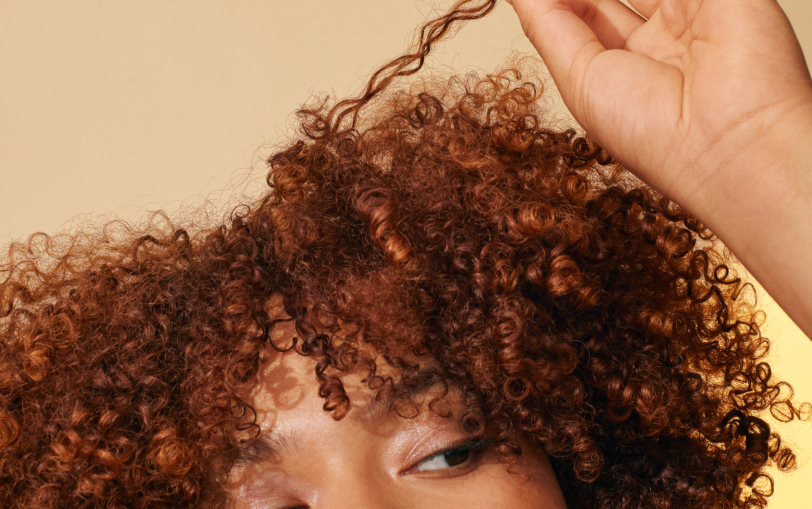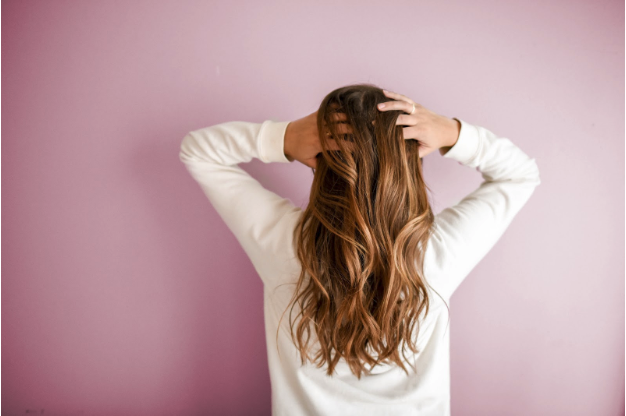lifestyle
The 10 Best Vitamins and Supplements for Hair Growth
On This Page

Thicker, healthier, hair starts with diet. Learn all about the best vitamins and supplements for hair.
If you're looking for ways to unlock the secrets to healthier and stronger hair, look no further! From the well-known benefits of Biotin in supporting protein breakdown for hair and nail growth to the antioxidant powers of Vitamin C, we'll explore the essential nutrients that can nourish your hair from within. Read on to discover our top 10 favorite vitamins and supplements for hair growth.

1. Biotin
If you’ve looked into hair growth vitamins in the past, you’ve probably run across biotin, also called B7, or vitamin H. Biotin helps the body break down protein, which is essential for hair and nail growth.
Biotin deficiency is rare since most people obtain their biotin naturally through food. Some great food sources of biotin include organ meats, eggs, beans, nuts, seeds, and certain veggies. The recommended dietary allowance is 30 micrograms daily and increases for those who are pregnant or breastfeeding.
2. Vitamin C
We already know the balance between free radicals and antioxidants is important to hair health, since an excess of free radicals can damage hair. Vitamin C has powerful antioxidant properties that can help manage oxidative stress from free radicals. Our bodies also use vitamin C to produce collagen, which is a protein that plays an essential role in hair structure.
The recommended dietary allowance for vitamin C is between 75 mg for women and 90 mg for men. Foods like citrus, bell peppers, and broccoli are great sources of vitamin C. Those who are not consuming a diet rich in fruits and veggies may be deficient in vitamin C.
3. Vitamin D
Recent studies have shown a connection between vitamin D deficiency and hair loss, and vitamin D deficiency is a common problem throughout the U.S. Vitamin D deficiency affects an estimated 1 billion people worldwide. Fortunately, research has shown that incorporating vitamin D into your routine can help promote follicle growth, which is why it’s one of our top vitamins for healthy hair.
Our greatest natural source of vitamin D is sunlight, but it can be hard to get enough of it just through sun exposure alone — think clouds, buildings, and clothing. Thus, supplementing with vitamin D regularly can help ensure you’re giving your body what it needs to stay healthy.
4. Iron
Our bodies use iron to help red blood cells carry oxygen, and one of the major symptoms of iron deficiency, particularly in women, is hair loss. Some foods that are high in iron include red meat, poultry, seafood, spinach, and whole grains.
While iron is an essential part of a healthy diet, we recommend speaking with your doctor before adding an iron supplement since it can be problematic if you do not have a deficiency. Excess iron can be toxic to the body.
5. Zinc
Zinc is often cited for its immunity-supporting benefits, but it’s also being researched for its potential positive impact on supporting healthy hair. Although the exact role is unclear, zinc is an essential micronutrient that plays a role in managing the structure and function of hormones, enzymes, and proteins. In fact, zinc deficiency may contribute to temporary hair loss. After measuring zinc and copper ratios in participants, this study found that there may be a correlation between hair health and zinc status. This is why maintaining adequate zinc levels among other micronutrients may support healthy hair.
The recommended daily intake of zinc for men is 11 mg and 8 mg for women. Even though beef, lamb, and oysters contain the most zinc, those following a plant-based diet can still get zinc from foods like pumpkin seeds, legumes, and nuts. The main challenge is that plant-based sources contain properties (called phytates) that may make nutrient absorption a bit more challenging. So, if you’re not getting enough of this mineral through diet alone, supplementing can help.
6. Protein
While most people associate protein with muscle growth and development, it’s also what makes up most of our hair. Protein is a macronutrient, which means that, unlike vitamins and minerals, our bodies require large amounts of it.
Protein is what contributes to the overall structure and integrity of the hair shaft. So, when the hair lacks protein, it becomes weak, brittle, and prone to damage. If you don’t get much protein through your diet, incorporating a protein powder can help ensure you’re giving your body what it needs to help support strong muscles, hair, and nails.

7. Keratin
Keratin is a fibrous protein and it is important for structural support in the body and hair health. Studies have shown that keratin supplementation may support hair growth, fullness, and shine. In one study, participants supplementing with 500mg of keratin along with vitamins and minerals noticed a decrease in significant hair loss after 90 days. Care/of keratin comes from wool collected from free-range sheep roaming the grassy plains of New Zealand’s highlands.
8. Collagen
Collagen is a protein that forms the structural framework of various tissues in our body, including our hair. Collagen is necessary for a healthy, nourished scalp, which in turn can support optimal hair growth.
There are several food sources of collagen. As a matter of fact, did you know that eggshell membrane is one of them? Eggshell membrane is a vegetarian option of supplementation that has collagen, elastin, keratin, and hyaluronic acid, which are all important for overall hair health. In a pilot study, participants noticed brighter, thicker, and more hydrated hair after supplementing with 300 mg of eggshell membrane for 50 days.
9. Ashwagandha
Ashwagandha is a popular adaptogen that is primarily known for its stress-reducing properties. Yet, recent studies have hinted at its potential role in promoting healthy hair. Preliminary research suggests that ashwagandha may improve scalp circulation when applied topically, which could improve nutrient delivery to the hair follicles and support their growth. However, further research is still needed to fully understand the extent of ashwagandha's effects on hair.
10. Ginseng
Ginseng is an herb that may also hold promising potential when it comes to hair health. In vivo studies show the potential for ginseng to promote hair growth; however, additional research is needed before we can draw any definitive conclusions. In particular, red ginseng extract, along with its active compounds known as ginsenosides, are believed to enhance human dermal papilla cells' (hDPC) activity. It does this by activating ERK and AKT, which are signaling pathways that are necessary for hair follicle stem cell growth.
Furthermore, ginseng has been found to upregulate hair matrix keratinocyte proliferation while inhibiting the androgen receptor transcription induced by DHT (dihydrotestosterone), a hormone associated with hair loss.
What are the main extrinsic factors that affect hair health?
Hair loss is a common burden that affects both men and women, at all stages of life. The causes can be intrinsic (think genetics or hormones), or they can be extrinsic(things like nutritional deficiencies and oxidative stress).
If you’re losing hair due to intrinsic factors, supplements might not be very helpful for you. But the good news is that extrinsic factors (the ones we can address more easily) are much more common than most people realize, and proper supplementation can help. So, let’s break down some of the most common extrinsic factors that can affect hair growth.
Nutritional Deficiencies
We all know that a balanced diet is key for overall health and well-being, but it’s also essential for strong, healthy hair. Ideally, your diet should be made up of a balance of protein, healthy fats, fiber, fruits, and veggies like leafy greens, but even the best diets can still have gaps. Finding the right supplements to support your overall health can help you make sure your bases are covered.
Oxidative Stress
Our bodies are like finely tuned machines with many moving pieces all working together, and keeping everything in balance is critical for overall health.
Our environments are filled with something called free radicals, which are molecules with an uneven number of electrons. Because of this, free radicals are often referred to as unstable. That’s where antioxidants come in: antioxidants can give free radicals a spare electron, which neutralizes them, without becoming unstable themselves.
This process is called oxidation, and it occurs naturally in our bodies. But if we have an imbalance of free radicals and antioxidants, the unstable free radicals can do damage to fatty tissue, lipids, and protein, which are the major building blocks of our hair.
Hormonal Changes
Our hormones affect almost every process in our bodies, including hair growth. One common example is post-pregnancy hair loss. During pregnancy, hormonal shifts cause an increase in the anagen (growth) phase of the hair cycle, resulting in thicker and fuller hair. However, after delivery, the hormonal balance shifts once again, with estrogen dropping, leading to a rise in the telogen (resting) phase. This shift can unfortunately result in excessive shedding and temporary hair loss. Similarly, hormonal changes can also contribute to patterned hair loss. Be sure to share your hair concerns with your dermatologist or primary care physician to figure out the best plan of action based on your needs.
Mental & Emotional Stress
Mental and emotional stress can exert an influence on hair growth, primarily by impacting the hair cycle. When stress levels are high, the body’s natural response can lead to an increase in the number of follicles entering the telogen phase, also known as the resting phase of the hair cycle. The telogen phase is a period of inactivity for the hair follicle, during which the hair strand remains attached to the scalp but ceases to grow. There is always some level of mental and emotional stress present in certain moments of life. The best way to manage your stress is to look into some techniques that are appealing to you including but not limited to meditating, journaling, therapy, yoga, or going for a walk.
Age & Genetics
As we age, our production of structural proteins like collagen and keratin begins to decline, which in turn will affect our hair health. As we grow older, the rate of hair growth can decrease, resulting in thinner and slower-growing hair. Additionally, certain genes are associated with hair growth, hair density, and overall hair quality.
Other Lifestyle Factors
There are various lifestyle factors that can have a negative impact on hair health. For instance, sun damage does not just affect our skin, but also our hair. Prolonged exposure to the sun’s UV rays can lead to dryness, brittleness, and color fading.
Moreover, hair-dying practices, such as bleaching, can also affect hair health by stripping away its natural pigment and weakening hair strands. Lastly, frequent use of tight hairstyles can contribute to hair damage. The constant pulling and tension can weaken hair follicles.
Wearing UV-protective hair products, wearing hats, and opting for looser hairstyles can help prevent unwanted hair damage.
Do hair growth vitamins work?
The effectiveness of hair growth supplements largely depends on the underlying cause of hair loss or hair growth issues. Certain supplements may offer benefits in cases where hair loss or inadequate hair growth is related to nutrient deficiencies. These formulas are specifically designed to provide essential vitamins, minerals, and other nutrients that support hair health and growth.
To determine the efficacy of hair growth supplements, it is crucial to consider factors such as research and the quality of ingredients. Some companies conduct studies to evaluate the effectiveness of their formulas and measure hair growth and the impact of specific vitamins or nutrients. Additionally, assessing the quality of ingredients is essential. Look for supplements that combine a blend of scientifically-backed nutrients that are known to support hair health.
The Importance of a Balanced Diet for Hair Health
By consuming a balanced diet, you are more likely to obtain most of the vitamins and minerals you need to keep your hair healthy and strong. The nutrients we consume through our diet directly impact the structure and growth of our hair. Ensuring an adequate intake of essential vitamins, minerals, proteins, and healthy fats is essential for nourishing the hair follicles. Including a variety of foods such as lean meats, fish, eggs, nuts, seeds, fruits, vegetables, and whole grains can provide the necessary nutrients for healthy hair. And, staying hydrated by drinking plenty of water is also important for maintaining proper hair and overall health.
The Bottom Line
Maintaining healthy and vibrant hair goes beyond just using hair care products. It requires a holistic approach that includes addressing both intrinsic and extrinsic factors. While genetics and age play a role in hair health, factors such as nutrition, stress management, and lifestyle choices can significantly impact the condition of your hair. By incorporating a balanced diet, considering targeted supplements, and adopting healthy habits, you can support your hair's growth, strength, and overall vitality.



